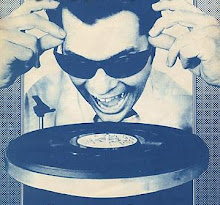 There was much more substance to the Police than Sting, the superstar artist. Without guitarist Andy Summers and drummer Stewart Copeland to help arrange the music, Sting's Roxanne may possibly have been recorded by someone else as a bossa nova track and the fledgling group might never have become stadium rockers.
There was much more substance to the Police than Sting, the superstar artist. Without guitarist Andy Summers and drummer Stewart Copeland to help arrange the music, Sting's Roxanne may possibly have been recorded by someone else as a bossa nova track and the fledgling group might never have become stadium rockers. Reading from his critically-acclaimed memoir, One Train Later, here Summers tells how the Police collectively developed their Outlandos d'Amour megahit and, in so doing, also defined the group's distinctive sound:
Andy Summers reads from One Train Later
From One Train Later one learns that Summers is a few years older than those who became his eventual bandmates, and that he was no stranger to London's early rock scene. A fixture on the circuit, he jammed with recent arrival, Jimi Hendrix, and sold Eric Clapton his '59 Gibson Les Paul guitar after EC's matching model was stolen.
Eric records Fresh Cream with my Les Paul [and] the terms Les Paul and Clapton become synonymous...before it was regarded as a weird failure...But possibly because of our little interchange, it becomes a Stradivarius of rock guitars.Together with keyboard player and vocalist Zoot Money, Summers founded Dantalian's Chariot, soon a local headliner. In '67 they found themselves on London concert bills with the likes of Pink Floyd, Soft Machine and the Crazy World of Arthur Brown. (Also achieving notoriety in Paris, Dantalian's Chariot disbanded after a series of foibles in Northern Scotland that resulted in a hospital stay for Summers.)
Soon Money and Summers found it more lucrative to play sidemen to Eric Burdon in the New Animals. Life was good until Burdon decided to go in a different direction during a U.S. tour. After floundering awhile, Summers joined the Soft Machine but was dismissed just before they were to tour the states as a supporting act to Hendrix's Experience. A serendipitous, career-saving stint with Neil Sedaka (who was big in the U.K.) followed, and when the Rolling Stones went looking for a replacement for departing guitarist Mick Taylor, Summers was on their short list.
Other accounts like these take the reader half-way through the book. The remainder details the history of the Police, culminating in their historic Shea Stadium appearance. Many more fastinating anecdotes await you, including a wild chance encounter with John Belushi while vacationing in Bali!
Captured shortly after the release of his memoir, below is Summers being interviewed on the BBC's Later... With Jools Holland. This segment includes some brief footage of the Police as they approach the pinnacle of their career:
What's not well-known is how accomplished a guitarist Summers is and the numerous styles he can readily play, including jazz and classical music. Since the Police, he has recorded numerous albums as a leader or in collaboration with others, including (old friend) Robert Fripp, Ginger Baker, Brian Auger, Herbie Hancock and Brazilian jazz pianist, arranger, vocalist and songwriter, Elaine Elias. Listen to two tracks from Summers' World Gone Strange:
| World Gone Strange | Oudu Kanjaira |
